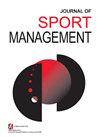为什么薪酬不公平的学员依然存在?发展联盟中的薪酬公平与人力资本投资
IF 3.5
2区 管理学
Q1 HOSPITALITY, LEISURE, SPORT & TOURISM
引用次数: 1
摘要
薪酬公平理论和人力资本理论在受训者感受到薪酬不公平但从培训中获得巨大潜在回报的情况下,对受训者的职业流失做出了不同的预测。因此,本研究的目的是检验薪酬公平和人力资本投资如何结合起来,以解释为什么学员在感受到薪酬不公平时,会有动机坚持就业。对144名职业棒球小联盟运动员的横断面调查数据显示,运动员感知到不公平的薪酬,但由于他们感知到较高的学习成就,并期望最终进入职业棒球大联盟,因此他们的职业离职意愿较低。在某些情况下,对不公平薪酬的认知只会增加职业更替的意图,比如当运动员在未来3年内至少参加一场美国职业棒球大联盟比赛的期望很低时。研究结果支持人力资本理论与薪酬公平理论相结合的框架来解释受训者动机的边界条件。本文章由计算机程序翻译,如有差异,请以英文原文为准。
Why Do Unfairly Paid Trainees Persist? Pay Fairness and Human Capital Investment in Development Leagues
Pay fairness and human capital theories make different predictions about trainees’ occupational turnover in situations where trainees perceive unfair pay but receive huge potential returns from training. Therefore, the purpose of this study was to examine how pay fairness and human capital investment combined to explain why trainees are motivated to persist in employment when they perceive unfair pay. Cross-sectional survey data from 144 minor league baseball players showed that athletes perceived unfair pay but had low occupational turnover intentions because they perceived high learning achievement and expected to play in Major League Baseball eventually. Perceptions of unfair pay only increased occupational turnover intentions under certain conditions, such as when athletes had low expectations of playing at least one game in Major League Baseball in the next 3 years. The results support a framework that combines human capital theory and pay fairness theories to explain boundary conditions for trainee motivation.
求助全文
通过发布文献求助,成功后即可免费获取论文全文。
去求助
来源期刊

Journal of Sport Management
社会科学-运动科学
CiteScore
5.80
自引率
19.40%
发文量
33
审稿时长
>12 weeks
期刊介绍:
The sport management industry is growing by leaps and bounds, with an explosion in research projects, texts, and university programs. As the field continues to rapidly evolve, it’s imperative for sport managers to keep abreast of the latest developments. The peer-reviewed Journal of Sport Management (JSM) is your key to staying on top of current issues and trends in this dynamic field. An official journal of the North American Society for Sport Management, JSM brings you thought-provoking editorials, research articles, and reviews that examine a number of areas as they relate to the management, governance, and consumption of sport, such as: organizational theory, behavior, and strategy; sport operations; marketing, consumer behavior, sponsorship, advertising, and licensing; media, communications, and public relations; sport tourism; facility and event management; and gender and diversity.
 求助内容:
求助内容: 应助结果提醒方式:
应助结果提醒方式:


